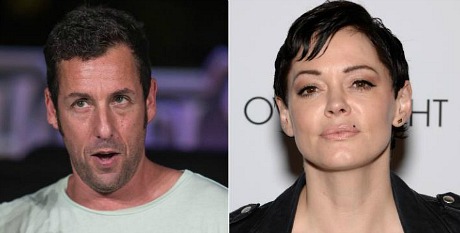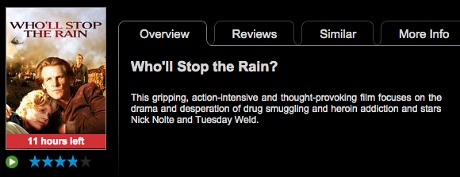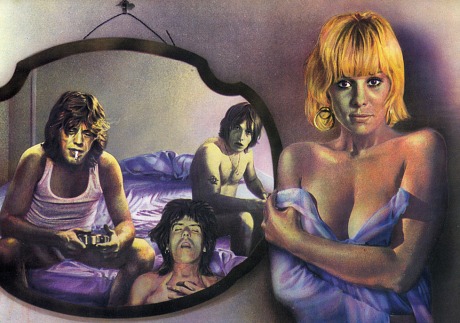“An air of Hitchcockian menace and free-floating sexual perversity is by now nothing new for Francois Ozon, but rarely has this French master analyzed the cracks in his characters’ bourgeois facades to such smooth and pleasurable effect as he does in The New Girlfriend. A skillfully triangulated psychological thriller about a woman who learns that the husband of her deceased [best friend] is harboring a most unusual secret, this delectable entertainment is as surprising for its continually evolving (and involving) dynamics of desire as for its slow-building emotional power, making for a warmer, more open-ended experience than the creepy Ruth Rendell tale from which it’s been ‘loosely adapted.’ Powered by beautifully controlled performances from Anais Demoustier and Romain Duris, Ozon’s Girlfriend should have willing arthouse escorts lining up worldwide.” — from Justin Chang‘s 9.10.14 Toronto Film Festival review.
 Jeffrey Wells
Jeffrey Wells
In The Matter Of Gone With The Wind
Two days ago N.Y. Post critic Lou Lumenick called for a shunning of Gone With The Wind, not because it suddenly stinks but because its “undeniably racist” attitudes are no longer tolerable in our current socio-political climate, particularly in the wake of the Charleston massacre and Gov. Nikki Haley‘s decision to remove the Confederate flag from the South Carolina statehouse, and everyone else calling for a similar banning. So it’s not as if Lou is standing against the wind here.
There’s never been any question that David O. Selznick‘s epic ignores and sugarcoats the realities of 19th Century slavery, and that its Technicolor depiction of the Old South as a fair land of cavaliers and cotton fields makes it in some ways a dark and odious fantasy piece — the anti-12 Years A Slave. Consciousness does evolve and for all its elan and polish, Gone With The Wind has become more and more of an unsavory antique in some respects. No argument there.
Lumenick notes that GWTW “isn’t as blatantly and virulently racist as D.W. Griffith’s Birth of a Nation, which was considered one of the greatest American movies as late as the early 1960s, but is now rarely screened, even in museums,” but he’s suggesting that it may one day disappear from the cultural conversation and suffer a permanent downgrade when it comes to estimating the all-time great films.
Lumenick is not wrong, but I feel misgivings. I don’t believe it’s right to throw Gone With The Wind under the bus just like that. Yes, it’s an icky and offensive film at times (Vivien Leigh‘s Scarlett O’Hara slapping Butterly McQueen‘s Prissy for being irresponsible in the handling of Melanie giving birth, the depiction of Everett Brown‘s Big Sam as a gentle, loyal and eternal defender of Scarlett when the chips are down) but every time I’ve watched GWTW I’ve always put that stuff in a box in order to focus on the real order of business.
Takes Balls For Non-Pro to Sing A Capella
“It’s true, the flag did not cause these murders,” President Obama said during a eulogy in Charleston today for Rev. Clementa Pinckney and the other eight victims of Dylann Roof. “We all have to acknowledge the flag has always represented more than just ancestral pride. For many, black and white, that flag was a reminder of systemic oppression and racial subjugation. We see that now. By taking down that flag, we express God’s grace.”
Unenlightened Shadows Cast
Last night I paid $15 and change to see Seth MacFarlane’s Ted 2. I needed to see the damn thing for the column so I didn’t mind the expenditure, but I definitely felt soiled as I drove home. All in all MacFarlane’s mind has (a) made my life feel a tiny bit uglier, (b) sprayed a stinky after-smell around the room and (c) left faint grease streaks on my soul. MacFarlane seems like a sharp and amusing guy when he’s talking to Kimmel or Fallon or Conan, but the stuff he creates (Ted flicks, A Million Ways To Die in the West and “We Saw Your Boobs” on the Oscar show) is aimed at the lowest and laziest — those tens of millions of jocky, ESPN-watching, ball-scratching, aggressively unenlightened couch gorilla loyalists. MacFarlane fans are 21st Century Archie Bunkers, guy-guys who’ve probably loved watching Family Guy since ’09 or ’10 and love to sit around and get high and squat in their little dinosaur-brained realm. And because Ted 2 is so precisely tailored to the sensibilities of these dipsticks (who are really on the level of your typical 12 or 13-year-old parentally-abused sociopath) it’s not funny. Two or three goons sitting behind me were chortling but I was sitting there like a vacuum cleaner with the power cord ripped out. Ted 2 is pure drainage.
Okay, that’s not 100% true as I quite enjoyed the opening Busby Berkeley number. I was also amused by the Raging Bull kitchen-argument parody scene that happens around…what, the 10-minute mark? But the rest is shit on a stick. Let’s get high, dude. Wait…a pretty blonde attorney representing Ted in a human-dignity case (Amanda Seyfried) gets high in her law office? Down wit dat but why does she say “eff” Scott Fitzgerald…ya gotta problem with the guy? We don’t have a lot of income but we live in Back Bay. If you want the sperm of New England Patriots quarterback Tom Brady so you can artificially inseminate your wife, you can’t ask Brady for a favor — you have to sneak into his bedroom and try to jerk him off without waking him up. And speaking of greatly impressive schtufenhaufers, every Google search is two clicks away from “black cock.”
You’ve read about Ted 2‘s big scene in a Boston sperm bank –i.e., Mark Wahlberg‘s John covered in splooge after tipping over a cart filled with dozens of samples from black guys with sickle-cell anemia, and Ted cracking that “you’re covered in rejected black guys’ sperm…you’re like a Kardashian.” I was shaking my head and going “what the fuck is this?” What kind of a baggy-shorts-wearing beefalo would find this remotely funny?
Hot Time In Old Town Tonight
This morning the social momentum in favor of gay marriage found fruition in the form of a landmark decision from the Supreme Court. The Supremes have had quite a week. A day or two ago they upheld key provisions of Obamacare, and this morning they’ve ruled 5-to-4 to legalize gay marriage in all 50 states. The liberal legacy of Barack Obama is locked and ratified. We all have something to celebrate tonight while rural rightie homophobes are, I hope, cussing and punching their refrigerator doors and dropping to their knees in despair, crying and clutching their Bibles. Marriage is no cool breeze, no picnic, no walk in the park. A good one requires loads of work and the stamina of a plow horse (especially sexually), but it sure takes you out of yourself. It’s nice to pool your resources (financial, spiritual) and to watch your significant other’s back from time to time, to have someone to share chores with and to argue with about this or that. And it’s profoundly calming to have someone to shop at Pavilions with on Sundays.

Who Are You?
I distinctly remember that when I first heard this line in a Manhattan theatre it was greeted with laughter from three or four guys in the orchestra, me included. It felt close to home because I’d been half-flirting with the idea of being someone who might never quite get it together. Half-flirting and half-terrified. My would-be writing career was actually starting to come together at that point (’78) but I was so accustomed to things being semi-awful and anxious…a tough time. I’ve nonetheless loved this line ever since. Nobody seems to write dialogue like this any more, and if they are it’s not happening enough. Can you imagine a line like this being spoken in Avengers: Age of Ultron?
With
Kray It As It Lays
I’m irked that Universal isn’t opening Brian Helgeland‘s Legend until October 2nd. Who wouldn’t be? The period crime drama looks snappy and noirish and altogether delicious. You just know that Tom Hardy‘s dual performance as Ronald and Reginald Kray is going to ring a whole string of bells. A perfect antidote to the summer doldrums. But all we’ll get for the next three months are Legend trailers, Legend trailers and more Legend trailers. Pic might turn up at the Venice or Telluride festivals; it’ll certain play Toronto.
McGowan Wenzel Muller Sandler
Last night Rose McGowan tweeted that her agent had cut her loose because she’d recently tweeted a complaint about an allegedly sexist casting call for an Adam Sandler film, one that urged auditioning actresses to wear a “form-fitting tank that shows off cleavage (push-up bras encouraged).” McGowan tweeted that “I just got fired by my wussy acting agent because I spoke up about the bullshit in Hollywood.” This morning it was reported that McGowan’s agent, Innovative Artists’ Sheila Wenzel, has left Innovative, but before the McGowan tweet surfaced last night. McGowan may have been referring to her other Innovative agent, Steve Muller. Today McGowan tweeted that Wenzel “is a wonderful agent that ceased working with Innovative before my firing. She’s a good, strong woman I’m proud to know.”

Adam Sandler, Rose McGowan.

Sheila Wenzel, formerly of Innovative Artists.
Ray Hicks, Pigs In Utah, etc.
The 2001 MGM Home Video DVD of Karel Reisz‘s Who’ll Stop The Rain has never looked great, and in some portions (particularly the opening passages in Vietnam) it seems to have been processed in barley soup. There’s now a high-def version available for rental on Vudu, and I’m telling you it’s a major revelation. For the first time since it opened in the spring of ’78 (it’s vaguely horrifying to think that was over 37 years ago) you can see what this film actually looked like — how it was truly meant to be seen by dp Richard Kline. All hail “Samurai Ray” Hicks — the greatest character ever played by Nick Nolte and arguably his finest performance. When I first began to self-describe as “samurai,” you can bet I wasn’t thinking of Toshiro Mifune. Created by “Dog Soldiers” author Robert Stone, Hicks is one of the great 20th Century American heroes, “semper fi”…and inspired, of course, by the legendary Neal Cassady. Here’s an absolutely vital Hicks dialogue clip.


HE’s own Svetlana Cvetko during a commercial shoot in Utah, taken a day or two ago
Relationship Between Ted 2 and Dylann Roof
“This is probably not the moment for Ted 2, a time when a young white man can sit among a group of black Charleston churchgoers for the better part of an hour before taking out his weapon and shooting nine of them dead; one in which the ensuing conversation focuses on whether the cause was racism and why we have to keep going there even after it’s been demonstrated that the shooter was well steeped in white-supremacist concerns. It’s one in which the president can come under fire for saying the n-word as though he were using it the way [it’s used] in Seth MacFarlane’s movie; and one in which the cross-racial outrage over the racist flag that waves on the South Carolina capitol lawn reached such a political pitch that, for the first time, there’s actually a possibility that it could be removed.” — from Wesley Morris’s 6.2 review, posted on Grantland.


Having missed the Ted 2 all-media (I won’t see Seth MacFarlane‘s film until Friday or Saturday), I’m not in a position to connect the dots between a potty-mouthed toy bear and the recent Charleston slaughter. But you have to give credit to Morris, at least, for pushing a curious hot button that, whatever the merits, everyone is paying attention to this morning. And not cynically — Morris obviously means every word.
I Shag Therefore I Am
“Described by its own writer-director Leslye Headland as ‘When Harry Met Sally for assholes’, Sleeping with Other People is so deeply in debt to its predecessor that it’s a near-remake. Which could be awful, except Headland’s script is so hilarious, so full of achingly well-observed one-liners on sex and relationships and parenting that it qualifies as a sparkling new rethink of a beloved film we’ve all seen too many times.” — from Kyle Smith’s 1.25.15 Sundance Film Festival review.
HE Half-Time Oscar Noms
Instead of listing the best films of 2015 so far, which is what everyone is doing, I’m breaking it down as half-time Oscar nominations. The Best Picture category is a full boat (ten noms) but the other categories are threadbare, catch-as-catch-can. If I consider commercial releases only, the first six months have been somewhat thin. So let’s include new films I’ve seen this year in all formats and situations — mostly theatrical and film festival but also cable and VOD. This is just a first draft, of course. Suggestions, reminders and disputes are solicited.
Keep in mind that things always look a bit fallow in late June, and that at least 21 heavy hitters have yet to be seen (A Bigger Splash, Black Mass, Bridge of Spies, Brooklyn, By The Sea, Concussion, The Danish Girl, Demolition, Everybody Wants Some, Hail Caesar!, Joy, Money Monster, Our Brand Is Crisis, The Program, The Revenant, Silence [‘2015 or ’16?], Snowden, Spotlight, Steve Jobs, Suffragette, Trumbo).
Top Five 2015 Best Picture nominees (in order of excellence/preference): 1. Love & Mercy (d: Bill Pohlad), 2. Son of Saul (Cannes, d: Laszlo Nemes), 3. Carol (Cannes, d: Todd Haynes), 4. Mad Max: Fury Road (d: George Miller), 5. Going Clear: Scientology and the Prison of Belief (HBO, d: Alex Gibney),
Best Picture nominees, second grouping: 6. Drunk Stoned Brilliant Dead: The Story of the National Lampoon (Sundance, d: Douglas Tirola); 7. About Elly (d: Asghar Farhadi); 8. Inside Out (d: Pete Docter — I didn’t care for the experience of watching this film but I have to give the animated devil his due — this is a smart, clever, thematically engaging go-getter “ride” movie); 9. Far From The Madding Crowd (d: Thomas Vinterberg). SPECIAL ADD-ON: 10. Brooklyn (missed it at Sundance but everybody did cartwheels so I’m going on faith here — d: John Crowley, screenplay: Nick Hornby).

